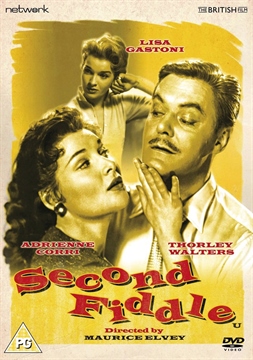"Mademoiselle from Armentières" is an English song that was particularly popular during World War I. It is also known by its ersatz French hook line, 'Inky Pinky Parlez Vous,' or the American variant 'Hinky Dinky Parlez-vous'. 'Inky Pinky' was a Scottish children's name for parsnip and potato cakes, but it has been suggested that an onomatopoeic reference to the sound of bed springs is more likely a soldier's ribald derivation.

Marie Ault was a British character actress of stage and film.

John Stuart, was a Scottish actor, and a very popular leading man in British silent films in the 1920s. He appeared in three films directed by Alfred Hitchcock.
Maurice Elvey was one of the most prolific film directors in British history. He directed nearly 200 films between 1913 and 1957. During the silent film era he directed as many as twenty films per year. He also produced more than fifty films – his own as well as films directed by others.

Second Fiddle is a 1957 British comedy film directed by Maurice Elvey and starring Adrienne Corri, Thorley Walters, Lisa Gastoni and Richard Wattis. The film was produced by Robert Dunbar for Act Films Ltd. It was the final film of prolific director Maurice Elvey.
Maria Marten, or the Mystery of the Red Barn is a 1913 British silent drama film directed by Maurice Elvey. It was based on the 1827 Red Barn Murder. The story of Maria Marten was a popular stage melodrama of the Victorian era, and five films based on the story were made between 1902 and 1935.

London is a 1926 British silent romantic drama film, directed by Herbert Wilcox and starring Dorothy Gish. The film was adapted by Wilcox from a short story by popular author Thomas Burke. The British Film Institute considers this to be a lost film.
White Heat is a 1926 British drama film directed by Thomas Bentley and starring Juliette Compton, Wyndham Standing and George Bellamy. The screenplay concerns a dancer who becomes romantically involved with a producer.
Frank Henry "Alf" Goddard was an English film actor.

Estelle Brody was an American actress who became one of the biggest female stars of British silent film in the latter half of the 1920s. Her career was then derailed by a series of ill-advised decisions and she disappeared from sight for many years before re-emerging between the late 1940s and the 1960s in smaller supporting film and television roles.

Hindle Wakes is a 1927 British silent film drama, directed by Maurice Elvey and starring Estelle Brody and John Stuart. The film is adapted from Stanley Houghton's 1912 stage play of the same name, and reunites Brody and Stuart following their hugely popular pairing in the previous year's Mademoiselle from Armentieres. The film was also released under the title Fanny Hawthorne.

Kitty is a 1929 British drama film directed by Victor Saville and starring Estelle Brody and John Stuart. The film was adapted from the 1927 novel of the same name by Warwick Deeping and marked the third co-star billing of Brody and Stuart, who had previously proved a very popular screen pairing in Mademoiselle from Armentieres (1926) and Hindle Wakes (1927).
The Last Post is a lost 1929 British silent drama film directed by Dinah Shurey and starring John Longden, Frank Vosper and Alf Goddard. The film was the first solo directorial venture by Shurey, who was the only female producer and director working in the British film industry at the time. It also became the main source of a libel action launched by Shurey against the magazine Film Weekly.
Comradeship is a 1919 British silent film drama, directed by Maurice Elvey and starring Lily Elsie, Gerald Ames and Guy Newall. The film's action covers the entire span of World War I, from the months before the outbreak of hostilities to the declaration of peace.

Humbertson Wright, sometimes credited as Humberstone Wright or Humberston H. Wright, was a British film actor.
The Glad Eye is a 1927 British silent comedy film directed by Maurice Elvey and starring Estelle Brody, Mabel Poulton and Jeanne de Casalis. It was a remake of The Glad Eye, a 1920 film based on the play Le Zebre by Paul Armont. It was made at Twickenham Studios.
Sailors Don't Care is a 1928 British silent comedy film directed by W. P. Kellino and starring Estelle Brody, John Stuart and Alf Goddard. It is based on a novel by "Seamark".

The Flight Commander is a 1927 British silent war film directed by Maurice Elvey and starring Alan Cobham, Estelle Brody and John Stuart. It was made by British Gaumont at their Lime Grove Studios in Shepherd's Bush. The celebrated First World War pilot Alan Cobham appeared as himself. It is also known by the alternative title of With Cobham to the Cape.
Mademoiselle Parley Voo is a 1928 British silent drama film directed by Maurice Elvey and starring Estelle Brody, John Stuart and Alf Goddard. It was made as a sequel to Elvey's earlier hit Mademoiselle from Armentieres (1926), and was equally successful. Both films refer to the popular First World War song Mademoiselle from Armentières. It was made at Lime Grove Studios in Shepherd's Bush.

Andrew Mazzei (1887–1975) was a French-born British art director who designed the sets for more than sixty films during his career. Mazzei began his career in the late 1920s during the silent era including on the futuristic High Treason. By the 1930s he was working for Gainsborough Pictures, designing backdrops for the critically acclaimed train-set thriller Rome Express in 1932.










